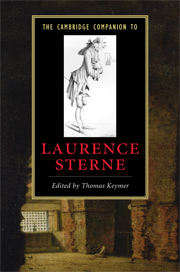Book contents
- Frontmatter
- Introduction
- 1 Laurence Sterne’s life, milieu, and literary career
- 2 Scriblerian satire, A Political Romance, the ‘Rabelaisian Fragment’, and the origins of Tristram Shandy
- 3 Tristram Shandy, learned wit, and Enlightenment knowledge
- 4 Tristram Shandy and eighteenth-century narrative
- 5 The Sermons of Mr. Yorick: the commonplace and the rhetoric of the heart
- 6 A Sentimental Journey and the failure of feeling
- 7 Sterne’s ‘politicks’, Ireland, and evil speaking
- 8 Words, sex, and gender in Sterne’s novels
- 9 Sterne and print culture
- 10 Sterne and visual culture
- 11 Sterne and the Modernist Moment
- 12 Postcolonial Sterne
- Further reading
- Index
- Series List
1 - Laurence Sterne’s life, milieu, and literary career
Published online by Cambridge University Press: 28 January 2010
- Frontmatter
- Introduction
- 1 Laurence Sterne’s life, milieu, and literary career
- 2 Scriblerian satire, A Political Romance, the ‘Rabelaisian Fragment’, and the origins of Tristram Shandy
- 3 Tristram Shandy, learned wit, and Enlightenment knowledge
- 4 Tristram Shandy and eighteenth-century narrative
- 5 The Sermons of Mr. Yorick: the commonplace and the rhetoric of the heart
- 6 A Sentimental Journey and the failure of feeling
- 7 Sterne’s ‘politicks’, Ireland, and evil speaking
- 8 Words, sex, and gender in Sterne’s novels
- 9 Sterne and print culture
- 10 Sterne and visual culture
- 11 Sterne and the Modernist Moment
- 12 Postcolonial Sterne
- Further reading
- Index
- Series List
Summary
'Tristram Shandy is still a greater object of admiration, the Man as well as the Book.' Thomas Gray's comment on Laurence Sterne's extraordinary literary and social success was written in April 1760, little more than three months after the publication of the first two volumes of The Life and Opinions of Tristram Shandy, Gentleman (1759-67). That Sterne had so quickly become not only a literary celebrity but one synonymous with the witty hero of his novel was astonishing enough. Still more remarkable was the fact that, by the spring of 1760, the celebrity author was equally well known in a second guise: as the good-natured Parson Yorick, whose character would survive his demise in the opening volume of Tristram Shandy to become the purported author of Sterne's second great fiction, A Sentimental Journey through France and Italy (1768). In the eight years of extraordinary fame he was to enjoy before his own untimely death, the Revd Laurence Sterne kept himself in the public gaze by impersonating now Tristram, now Yorick - as suited his mood, his audience, or the moment - in an act of ludic self-fashioning without precedent in English letters. Sterne was born on 24 November 1713 in Clonmel, Ireland. His place of birth was fortuitous, for his parents had only recently arrived in the small County Tipperary town. Sterne's father, Roger, a junior army officer, had been posted with his regiment to Ireland from Dunkirk at the end of the War of the Spanish Succession; his mother, Agnes, daughter of an army provisioner, travelled with her husband. Though born into a prosperous family of Yorkshire gentry, Roger Sterne had left home in obscure circumstances that saw him financially insecure throughout the remainder of his life.
- Type
- Chapter
- Information
- The Cambridge Companion to Laurence Sterne , pp. 5 - 20Publisher: Cambridge University PressPrint publication year: 2009
- 1
- Cited by

